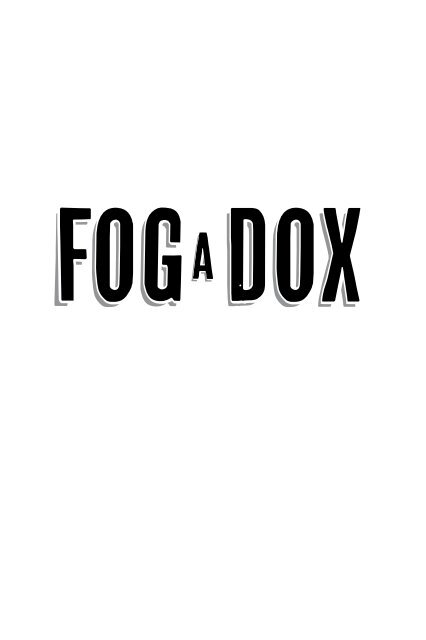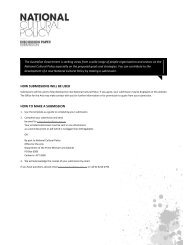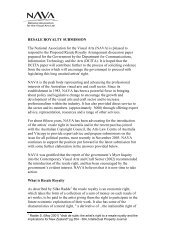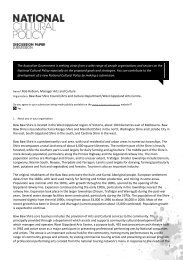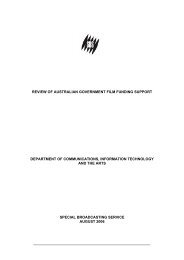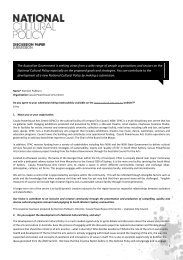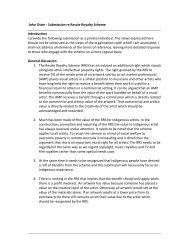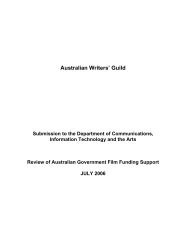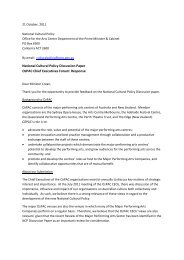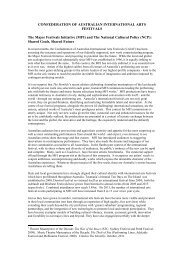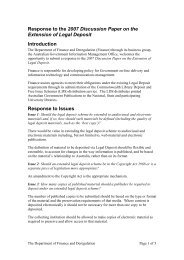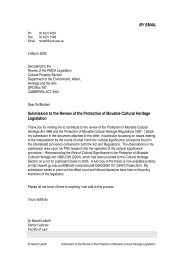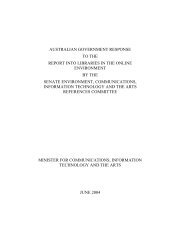Read the first chapter of Fog a Dox (PDF - 218KB)
Read the first chapter of Fog a Dox (PDF - 218KB)
Read the first chapter of Fog a Dox (PDF - 218KB)
Create successful ePaper yourself
Turn your PDF publications into a flip-book with our unique Google optimized e-Paper software.
<strong>Fog</strong> a <strong>Dox</strong>
<strong>Fog</strong> a <strong>Dox</strong><br />
Bruce<br />
Pascoe
First published by Magabala Books Aboriginal Corporation, Broome, Western<br />
Australia in 2012 Website: www.magabala.com Email: sales@magabala.com<br />
Copyright © Bruce Pascoe 2012<br />
For Brim, a dingo dog<br />
All rights reserved. Apart from any fair dealing for <strong>the</strong> purposes <strong>of</strong> private study,<br />
research, criticism or review, as permitted under <strong>the</strong> Copyright Act, no part<br />
<strong>of</strong> this publication may be reproduced by any process whatsoever without <strong>the</strong><br />
written permission <strong>of</strong> <strong>the</strong> author, <strong>the</strong> illustrator and <strong>the</strong> publisher.<br />
Magabala Books receives financial assistance from <strong>the</strong> Commonwealth<br />
Government through <strong>the</strong> Australia Council, its arts advisory body. The State<br />
<strong>of</strong> Western Australia has made an investment in this project through <strong>the</strong><br />
Department <strong>of</strong> Culture and <strong>the</strong> Arts in association with Lotterywest.<br />
Designed by Tracey Gibbs<br />
Illustrations by Brenda Marshall<br />
Printed in China at Everbest Printing Company<br />
Cataloguing-in-Publication available from <strong>the</strong> National Library <strong>of</strong> Australia<br />
ISBN 978-1-921248-55-9
Lyrebirds<br />
Albert Cutts was a tree feller. A fella who cuts<br />
down trees.<br />
People will always need wood for <strong>the</strong>ir houses,<br />
he told <strong>the</strong> possums, but <strong>the</strong> possums always<br />
needed apples for <strong>the</strong>ir mouths and only ever really<br />
concentrated when food was involved. In any case<br />
<strong>the</strong>y lived in trees and couldn’t see <strong>the</strong> sense in<br />
cutting <strong>the</strong>m down. So <strong>the</strong>y just glared at Albert<br />
even though <strong>the</strong> apples were <strong>of</strong>f his tree.<br />
Albert didn’t cut down trees for nothing – that<br />
7
was his job. No-one knew <strong>the</strong> bush as well or loved it<br />
more deeply. He lived in a hut beside a stream deep<br />
in <strong>the</strong> forest. He built <strong>the</strong> hut with planks split from<br />
forest timber, <strong>the</strong> ro<strong>of</strong> from bark peeled <strong>of</strong>f logs.<br />
Albert was happy <strong>the</strong>re. The only time he<br />
got really annoyed was when he heard his kettle<br />
whistling its head <strong>of</strong>f when he was way up in <strong>the</strong><br />
hills cutting logs.<br />
‘I didn’t leave <strong>the</strong> kettle on,’ he muttered to<br />
himself, ‘I’m sure I didn’t.’ He put his axe down,<br />
covered his lunch box with a piece <strong>of</strong> bark to keep<br />
<strong>the</strong> magpies and currawongs away, and walked<br />
down <strong>the</strong> hill, plodded across <strong>the</strong> creek flat, and<br />
stepped from stone to stone to cross <strong>the</strong> stream,<br />
<strong>the</strong> kettle whistling madly all <strong>the</strong> while, fit to burn<br />
itself out and he couldn’t afford that, he only had<br />
one kettle and he’d seen <strong>the</strong> price <strong>of</strong> new ones. Oh,<br />
he loved his cups <strong>of</strong> tea.<br />
He stepped through <strong>the</strong> door and stared at<br />
<strong>the</strong> wood stove. No kettle. It was where he left it,<br />
safely on <strong>the</strong> brick beside <strong>the</strong> sink.<br />
‘Lyrebird, that bloomin’ lyrebird again,’ he said<br />
to <strong>the</strong> owl that liked to roost on <strong>the</strong> rafter beside<br />
<strong>the</strong> chimney. Nice and warm up <strong>the</strong>re, and <strong>the</strong> only<br />
inconvenience was having to wait for Albert to let<br />
him out at night. But Albert was as reliable as <strong>the</strong><br />
sun in that regard.<br />
The owl blinked at <strong>the</strong> unusual anger in Albert’s<br />
voice and said nothing, not a hoot, but <strong>the</strong>n you<br />
never got much in <strong>the</strong> way <strong>of</strong> conversation from<br />
owls. Besides, <strong>the</strong> owl knew <strong>the</strong> tricks a lyrebird<br />
could play, had been fooled itself by <strong>the</strong> bird<br />
imitating squeaking bush mice and rabbits.<br />
‘That’s <strong>the</strong> third time he’s got me,’ growled<br />
Albert, ‘third time I’ve left work to come back to<br />
<strong>the</strong> hut, about time I woke up to it.’ But what if it<br />
really was <strong>the</strong> kettle? He couldn’t afford to let it<br />
burn out.<br />
‘Bloomin’ lyrebird makin’ me miss all that work.’<br />
Never mind, he thought, it gives me a chance to<br />
stoke <strong>the</strong> fire and check on Brim.<br />
Albert’s dog Brim was slumped in <strong>the</strong> corner on<br />
an old wheat bag as five voracious pups sucked at<br />
her teats, mewling in <strong>the</strong>ir anxiety to get as much<br />
milk as <strong>the</strong>y could, pushing at her with insistent little<br />
paws and butting her with <strong>the</strong>ir greedy muzzles.<br />
8<br />
9
Brim followed Albert’s movements, a wistful,<br />
yearning expression in her eyes. She missed being<br />
up on <strong>the</strong> ridge tops with <strong>the</strong> old bloke, sometimes<br />
snooping about <strong>the</strong> fox and wallaby trails,<br />
sometimes sleeping in <strong>the</strong> sun, dreaming <strong>of</strong> having<br />
a good chase through <strong>the</strong> trees. And sometimes<br />
she just did what dogs are very good at: scratching.<br />
Nothing like a good scratch, followed by a little<br />
sniff <strong>of</strong> <strong>the</strong> air, a glance at Albert, and <strong>the</strong>n a little<br />
dog-think, which never took very long because,<br />
well, dogs never think for long; food always looms<br />
too large in <strong>the</strong>ir mind and blots out anything but<br />
<strong>the</strong> thought <strong>of</strong> a bone buried near <strong>the</strong> woodheap<br />
– or was it under <strong>the</strong> verandah, or <strong>the</strong> apple tree?<br />
Oh, well, I forget where, I’ll have to check <strong>the</strong>m all.<br />
Albert would sometimes catch Brim as one<br />
<strong>of</strong> her thoughts evaporated under <strong>the</strong> dominant<br />
influence <strong>of</strong> bone memories and call out to her,<br />
‘Lose concentration again, darlin’? It happens my<br />
furry princess, even to <strong>the</strong> best brains. One minute<br />
we’re working out how many eight-bee-one planks<br />
in a sixty-foot log and next minute we’re thinkin’ <strong>of</strong><br />
rabbit stew. It happens, ol’ darlin’, and that’s a fact.’<br />
But what Albert didn’t know was that Brim had<br />
been teaching herself to count. Don’t laugh, dogs<br />
can count. Smart dogs, anyway.<br />
For instance <strong>the</strong> bone under <strong>the</strong> verandah, or<br />
apple tree, or woodheap or … anyway, that bone<br />
is one bone. One. And <strong>the</strong> rabbit that ran under<br />
<strong>the</strong> dunny. One rabbit. One. She knew it was one<br />
because if <strong>the</strong>re’d been two, two, she wouldn’t<br />
know which one to chase. Simple, counting.<br />
And foxes. Like last winter when she had seen a<br />
pack <strong>of</strong> <strong>the</strong>m sitting in silhouette on <strong>the</strong> ridgeline<br />
staring down at <strong>the</strong>ir chookhouse. Brim counted<br />
<strong>the</strong>m. One fox, two fox, ah, ah, where’d I leave that<br />
bone? I hope <strong>the</strong>m fox don’t get it, now, where was<br />
I? Oh yes, one fox, two fox, ah, ah, lotsa foxes. See,<br />
I can count past two.<br />
But no counting foxes today. Too busy with <strong>the</strong><br />
pups, look at <strong>the</strong>m all, one pup, two pups, gee <strong>the</strong>ir<br />
little claws scratch … ah, one pup, two pups, ah,<br />
ah, piles <strong>of</strong> pups. There, did it again, counting.<br />
‘How are <strong>the</strong> pups goin’, Brim? Got ’em under<br />
control, have ya?’ Albert knelt down and stroked his<br />
dog’s head. She flattened her ears and stuck out <strong>the</strong><br />
10<br />
11
tip <strong>of</strong> her pink tongue. Gees she loved that Albert.<br />
‘You’re a good dog, Brim, a real good dog.’ He<br />
rubbed her between <strong>the</strong> ears and around <strong>the</strong> back<br />
<strong>of</strong> her neck and she closed her eyes in delight. Gees<br />
she loved that Albert.<br />
He stroked <strong>the</strong> silky muzzles <strong>of</strong> <strong>the</strong> pups, two<br />
<strong>of</strong> <strong>the</strong>m asleep with Brim’s teats in <strong>the</strong>ir mouths.<br />
‘Gees you’re good little pups,’ he murmured as he<br />
inspected <strong>the</strong>ir delicate pink paws, so innocent, so<br />
new, never walked on rough ground, never chased<br />
a cat, never felt pain. ‘Beautiful little boorais,’ <strong>the</strong><br />
old man murmured, unconsciously using <strong>the</strong> Maap<br />
word for babies.<br />
His grandfa<strong>the</strong>r taught him that. Old Grandad<br />
Shorty. Short Cutts, get it, very funny. Grandad<br />
Shorty only knew a dozen or so words <strong>of</strong> his<br />
mo<strong>the</strong>r’s Maap language but that was better<br />
than nothing.<br />
Old Shorty was pretty dark, but most blokes<br />
who worked in <strong>the</strong> forest splitting railway sleepers<br />
were like that. Wood sap, charcoal, sweat, <strong>the</strong>y<br />
got in your pores. And Albert was much <strong>the</strong> same.<br />
Years <strong>of</strong> cutting trees had stained <strong>the</strong> creases in his<br />
hands, years <strong>of</strong> grubbing out roots, splitting posts,<br />
burning <strong>of</strong>f <strong>the</strong> heads, well, you got a bit brown, so<br />
no-one remarked too much about Albert’s colour,<br />
he was much like any o<strong>the</strong>r old bloke in <strong>the</strong> bush.<br />
Albert’s secret was that he not only knew some<br />
words <strong>of</strong> <strong>the</strong> old language, but he used <strong>the</strong>m too.<br />
Mirrigan for dog, buln buln for lyrebird, wagra for<br />
crow, goomera <strong>the</strong> old possum, googai <strong>the</strong> owl<br />
beside <strong>the</strong> chimney, <strong>the</strong>y all knew <strong>the</strong> sound <strong>of</strong><br />
<strong>the</strong>ir own names, got used to Albert addressing<br />
<strong>the</strong>m with respect.<br />
That’s how Brim got her name. Old Grandad<br />
Shorty told a story about his own grandmo<strong>the</strong>r<br />
Daisy being born under a tree on <strong>the</strong> bank <strong>of</strong><br />
Lake Brim. Old Shorty remembered Granny Daisy<br />
bringing him up on a diet <strong>of</strong> condensed milk, bread<br />
and Golden Syrup … and stories, bush stories:<br />
why <strong>the</strong> red gums grow where <strong>the</strong>y grow, why <strong>the</strong><br />
magpie is black and white, and a bit <strong>of</strong> a rude one<br />
about why dogs sniff each o<strong>the</strong>r’s bums. One day<br />
all <strong>the</strong> dogs went to a big fancy dress ball and <strong>the</strong>y<br />
left <strong>the</strong>ir tails …<br />
‘Ah, I’d better get back to work,’ Albert told<br />
12<br />
13
Brim, ‘but I’m glad to see you’ve got your own tail,<br />
my old darlin’.’<br />
Albert stumped his way up <strong>the</strong> hill where his axe<br />
and wedges waited on a day’s hard labour. The hills<br />
and valleys soon chimed to <strong>the</strong> strokes <strong>of</strong> his axe<br />
and <strong>the</strong> ring <strong>of</strong> <strong>the</strong> mallet on <strong>the</strong> steel wedge as he<br />
split posts. It was hard work, but pleasant enough,<br />
with <strong>the</strong> company <strong>of</strong> a yellow robin perched<br />
slantwise on a trunk, watching with eyes like little<br />
black pearls, sharp to any grubs or larvae exposed<br />
by Albert’s work.<br />
The kookaburra, kuark, was usually <strong>the</strong>re too,<br />
a beak like a pair <strong>of</strong> tin snips kept sharp for any<br />
lizard or snake silly enough to come out in <strong>the</strong><br />
open. Currawongs and magpies stood by with a<br />
show <strong>of</strong> disdain for human endeavour but <strong>the</strong>ir<br />
greedy beaks never refused <strong>the</strong> big white wood<br />
grubs that Albert dislodged from <strong>the</strong>ir tunnels in<br />
<strong>the</strong> logs.<br />
For Albert it was like being surrounded by<br />
friends and relations, some <strong>of</strong> <strong>the</strong>m close and<br />
confidential, o<strong>the</strong>rs haughty and a bit superior,<br />
some frantic to fill <strong>the</strong>ir bellies or, like <strong>the</strong> grey<br />
thrush, harried to exhaustion by a coronet <strong>of</strong><br />
gaping beaks squalling <strong>the</strong>ir hunger.<br />
Even <strong>the</strong> goanna would sidle up from time to<br />
time, sometimes saggy and baggy in dull grey<br />
flaking skin, but after he’d rubbed that <strong>of</strong>f against<br />
<strong>the</strong> coarse bark <strong>of</strong> a messmate he appeared bright<br />
yellow and black, like an enamelled prince.<br />
Albert loved <strong>the</strong> bush. Some would say it was<br />
a lonely life, eating a solitary lunch on a rocky<br />
hillside surrounded by <strong>the</strong> debris <strong>of</strong> fallen logs and<br />
split posts, but most times Albert had Brim to talk<br />
to and on <strong>the</strong> rare occasions when she couldn’t,<br />
like when she was suckling pups, <strong>the</strong>re were <strong>the</strong><br />
animals; bird song glinting from <strong>the</strong> tree tops,<br />
butterflies winking at him with <strong>the</strong> opening and<br />
shutting <strong>of</strong> brand new wings still damp from <strong>the</strong><br />
cocoon.<br />
Albert rested against a stump he’d cut in …<br />
now, when was it? Before Brim was born, yes,<br />
even before her mo<strong>the</strong>r, old Kudja, about a year<br />
or two before <strong>the</strong> last big flood, so it’d have to<br />
be, yes, 1972 or <strong>the</strong>reabouts, a long time anyway.<br />
The tree he felled today would be that tree’s sister,<br />
14<br />
15
and thirty metres away <strong>the</strong>re was a tree that he<br />
might cut in ano<strong>the</strong>r twenty years … Well, maybe.<br />
Maybe he’d still be swinging an axe in twenty<br />
years, or a chainsaw if he ever lowered himself to<br />
use a chainsaw, or could afford to buy one. Eight<br />
hundred and eighty dollars <strong>the</strong>y were, and that’s<br />
160 posts or two week’s work, nah, stick to <strong>the</strong><br />
axe, Albert, cuts all right … and quieter too.<br />
Brim would be coming with him again in a few<br />
days because <strong>the</strong> pups were getting bigger and<br />
she’d be wanting a rest from <strong>the</strong>m soon, <strong>the</strong> little<br />
devils. Their fa<strong>the</strong>r was one <strong>of</strong> <strong>the</strong> bush dingoes, as<br />
Brim’s own fa<strong>the</strong>r had been. The dog that mated<br />
with Brim was nearly pure dingo, dark like <strong>the</strong><br />
mountain dingoes are, a kind <strong>of</strong> golden chocolate<br />
with swatches <strong>of</strong> near-black at <strong>the</strong> nape and flanks.<br />
He was a beautiful dog, sharp as a tack. He’d quiz<br />
you with his eyes, trying to learn about you: if he<br />
could trust you, whe<strong>the</strong>r you were <strong>the</strong> kind <strong>of</strong><br />
bloke who shot creatures out <strong>of</strong> arrogance, just<br />
because he could, just because he had <strong>the</strong> power <strong>of</strong><br />
death within <strong>the</strong> reach <strong>of</strong> his finger.<br />
They’d only caught each o<strong>the</strong>r’s eye a few times,<br />
but each time it felt to Albert like an interrogation.<br />
What sort <strong>of</strong> man are you? How do you treat<br />
your dogs? Do you keep your chooks locked up at<br />
night? Would you get cranky if I fell in love with<br />
Brim or are you prejudiced against dingoes? That<br />
sort <strong>of</strong> look. They respected each o<strong>the</strong>r but <strong>the</strong>y’d<br />
never be mates, a wild animal and a man, never<br />
mates, deferential acquaintances, but never mates,<br />
because when a dog became <strong>the</strong> mate <strong>of</strong> a man he<br />
lost his wildness, lost <strong>the</strong> freedom to decide where<br />
he slept at night and <strong>the</strong> right to grab rabbits by<br />
<strong>the</strong> back <strong>of</strong> <strong>the</strong> neck.<br />
With his hat tipped over his eyes and his mug<br />
<strong>of</strong> tea cooling beside him Albert damn near dozed<br />
<strong>of</strong>f before he roused himself from contemplation<br />
<strong>of</strong> <strong>the</strong> canine universe and let his hand fall on <strong>the</strong><br />
smooth, hard shank <strong>of</strong> his axe, his uncomplaining<br />
work companion <strong>of</strong> thirty-five years … Well, it’d<br />
had nine or so handles and this was <strong>the</strong> third head,<br />
but it was still <strong>the</strong> same axe.<br />
He rose, his knees creaking, and slowly arched<br />
his back, stretching <strong>the</strong> tired muscles <strong>of</strong> his<br />
shoulders before striding over to <strong>the</strong> fallen log and<br />
16<br />
17
elting <strong>the</strong> wedge into a radial crack, driving it<br />
deeper and deeper until <strong>the</strong> post sprang out <strong>of</strong> <strong>the</strong><br />
log like a miracle.<br />
‘Good splittin’ wood this stringybark,’ Albert<br />
mused for <strong>the</strong> thousandth time, <strong>the</strong>n fell silent<br />
as a strange whining, piping cry reached his ear.<br />
He twisted and turned about to fix <strong>the</strong> position<br />
<strong>of</strong> <strong>the</strong> cry, wondering if it was <strong>the</strong> little communal<br />
mew that currawongs peeped to each o<strong>the</strong>r as<br />
<strong>the</strong>y searched for food, or <strong>the</strong> choughs who<br />
liked to march about toge<strong>the</strong>r like a band <strong>of</strong><br />
scarlet-eyed horticulturalists, turning over <strong>the</strong><br />
forest litter, and remarking convivially on <strong>the</strong><br />
fascination <strong>of</strong> moss and liverworts, mushroom<br />
mycelium and scrub worms.<br />
But if it was choughs <strong>the</strong>y’d eventually march<br />
into <strong>the</strong> clearing in <strong>the</strong>ir neat parade and if it was<br />
currawongs you’d never mistake <strong>the</strong>ir gangsta<br />
rap. No, it was an animal. He listened again …<br />
A baby animal.<br />
He leant <strong>the</strong> mallet against <strong>the</strong> log and walked<br />
quietly toward <strong>the</strong> noise, careful to avoid standing<br />
on twigs that might snap or dry eucalypt leaves<br />
that might betray him with <strong>the</strong>ir crunch. He stood<br />
still and waited, sure he was close to <strong>the</strong> source <strong>of</strong><br />
<strong>the</strong> noise. A group <strong>of</strong> granite boulders stood only<br />
twenty metres from him and he moved forward<br />
and to his right so that he might see around <strong>the</strong>m.<br />
He met <strong>the</strong> fierce eyes <strong>of</strong> a goshawk, defiant,<br />
challenging.<br />
The bird at <strong>first</strong> lowered its head in a show <strong>of</strong><br />
aggression but when Albert stood his ground,<br />
trying to see what <strong>the</strong> goshawk gripped in its<br />
talons <strong>the</strong> raptor stood to its full height, puffing<br />
out <strong>the</strong> hackles on its neck and chest and lifting<br />
its wings, trying to produce <strong>the</strong> illusion <strong>of</strong> having<br />
doubled in size. Despite <strong>the</strong> mad yellow glare <strong>of</strong> its<br />
truculent eyes, Albert refused to be intimidated.<br />
He leaned closer and could see at last what<br />
<strong>the</strong> bird protected so zealously: a baby fox, a tiny<br />
carcass from which <strong>the</strong> simitar beak had already<br />
torn strips <strong>of</strong> flesh. Albert scanned <strong>the</strong> area and<br />
saw <strong>the</strong> hole dug beneath <strong>the</strong> granite tor and <strong>the</strong><br />
flattened area before it where <strong>the</strong> baby foxes had<br />
been playing, for yes, <strong>the</strong>re were surely o<strong>the</strong>rs in<br />
<strong>the</strong> den and <strong>the</strong>y must have become impatient<br />
18<br />
19
waiting for <strong>the</strong>ir mo<strong>the</strong>r and ventured out to play<br />
in <strong>the</strong> sun.<br />
Why hadn’t <strong>the</strong> mo<strong>the</strong>r returned? She would<br />
have heard <strong>the</strong> goshawk’s attack call. Had <strong>the</strong><br />
mo<strong>the</strong>r taken a bait, been shot by bounty hunters,<br />
killed by an angry farmer who’d stayed up all night<br />
to see what had been raiding his chookpen? Albert<br />
backed away. There was nothing he could do for<br />
<strong>the</strong> little fox. The goshawk was probably desperate<br />
to feed its own young. Killing rabbits and mice was<br />
what goshawks did for a living but if a baby fox got<br />
too bold while its mo<strong>the</strong>r was away <strong>the</strong>y’d swoop<br />
on that too. That’s how <strong>the</strong> world goes around,<br />
rabbits eat <strong>the</strong> hearts out <strong>of</strong> Mrs Maloney’s<br />
wattle seedlings and goshawks eat <strong>the</strong> rabbits and<br />
Mrs Maloney’s chickens if she’s out for <strong>the</strong> day,<br />
drinking strong black tea on ano<strong>the</strong>r lady’s front<br />
verandah. ‘Aren’t <strong>the</strong> foxes bad this year, Mrs<br />
Maloney.’ ‘And <strong>the</strong> hawks, Mrs Bortolotto, <strong>the</strong>re’s<br />
one been keeping a wicked yellow eye on my<br />
chickens. Give it a good whack with <strong>the</strong> broom if I<br />
catch him.’<br />
But Mrs Maloney’s chickens are safe for ano<strong>the</strong>r<br />
day because <strong>the</strong> goshawk’s nestlings will feed on<br />
baby fox meat tonight.<br />
Albert split out his quota <strong>of</strong> posts but before it<br />
got dark he returned to <strong>the</strong> granite boulders and<br />
inspected <strong>the</strong> beaten sand at <strong>the</strong> entrance to <strong>the</strong><br />
den. No adult fox had snuck back to <strong>the</strong> cubs while<br />
he had been working. They were orphans.<br />
He knelt at <strong>the</strong> entrance and <strong>the</strong> acrid fox scent<br />
was overwhelming. He reached his arm in and<br />
followed <strong>the</strong> tunnel as it curved sharply beneath<br />
<strong>the</strong> granite. He could just feel <strong>the</strong> fur <strong>of</strong> an animal<br />
… and its teeth. The brave little fellow was trying<br />
to bite his hand. He clasped <strong>the</strong> tiny body and<br />
dragged it from <strong>the</strong> den, a fine little male fox,<br />
barely old enough to leave <strong>the</strong> den on its own,<br />
<strong>the</strong> eyes still bleary from <strong>the</strong> weeks spent in <strong>the</strong><br />
dark. He tucked <strong>the</strong> fox into his coat pocket and<br />
buttoned <strong>the</strong> tab before reaching into <strong>the</strong> tunnel<br />
again and finding ano<strong>the</strong>r cub, and ano<strong>the</strong>r. One,<br />
two, three little foxes. Brim should have been <strong>the</strong>re<br />
to practise her counting … as she ate <strong>the</strong>m: one<br />
little fox cub, two little fox cubs …<br />
Albert looked at <strong>the</strong> last cub and felt it tremble<br />
20<br />
21
as it tried to bury its face in his hand, searching<br />
for <strong>the</strong> security <strong>of</strong> its bro<strong>the</strong>r and sister’s fur. Poor<br />
little thing, he thought, should bump it on <strong>the</strong><br />
head really, a fox, a chicken killer, goose egg thief,<br />
should kill it, but … I can’t.<br />
The pads <strong>of</strong> <strong>the</strong> little paws were pink and s<strong>of</strong>t as<br />
a baby’s toes. How could you raise your hand to kill<br />
it, even though you knew it would grow into a killer<br />
itself? He couldn’t do it and that was that. Should<br />
never have reached into <strong>the</strong> hole, should have let<br />
<strong>the</strong>m die <strong>of</strong> starvation, would never have known<br />
<strong>the</strong> little fellows, should never have looked into <strong>the</strong>ir<br />
eyes and through to <strong>the</strong>ir tiny tremulous hearts,<br />
and after his thumb sought out <strong>the</strong> minute pulse he<br />
couldn’t have killed <strong>the</strong>m for all <strong>the</strong> tea in China.<br />
Choughs<br />
‘China,’ <strong>the</strong> girl wrote, ‘is a big country with a lot<br />
<strong>of</strong> people and <strong>the</strong>y grow tea … and rice.’<br />
She looked at what she had written, fiddled<br />
with <strong>the</strong> pen, rotating <strong>the</strong> plastic tube between her<br />
thumb and forefinger. ‘China.’ Her mo<strong>the</strong>r said she<br />
should keep up her schooling, even though she was<br />
sick. Too sick to be outside.<br />
She looked out <strong>the</strong> window. Seven birds waddled<br />
into <strong>the</strong> yard with a gait that made <strong>the</strong>ir tails sweep<br />
and bob. They seemed to be talking to each o<strong>the</strong>r,<br />
22<br />
23
like women down at <strong>the</strong> shops.<br />
‘Maria, have you finished your assignment yet?’<br />
Her mo<strong>the</strong>r said as she bustled into <strong>the</strong> room,<br />
always something bordering on accusation in her<br />
voice.<br />
‘Yes,’ Maria replied, knowing this answer would<br />
not be sufficient.<br />
‘Is this it? Just this, “China is a big …”’<br />
‘I was going to write more.’<br />
‘You were looking out <strong>the</strong> window.’<br />
‘What are those birds?’<br />
‘What birds?’<br />
‘Those ones, out <strong>the</strong>re, talking to each o<strong>the</strong>r.’<br />
Mrs Coniliopoulos went to <strong>the</strong> window trying<br />
to think <strong>of</strong> reasons why sick girls shouldn’t waste<br />
time looking at birds. When do I ever get time to<br />
look out windows?<br />
‘They … <strong>the</strong>y’re crows … scavengers, peck <strong>the</strong><br />
eyes out <strong>of</strong> lambs.’<br />
‘But <strong>the</strong>y’ve got white on <strong>the</strong>m.’<br />
‘Well, <strong>the</strong>y’re still scavengers, waltzing about,<br />
think <strong>the</strong>y own <strong>the</strong> place. Anyway it’s about time<br />
you finished <strong>the</strong> China assignment so I can take it<br />
up to <strong>the</strong> school. I don’t want you falling behind.<br />
When you get well and go back …’<br />
Maria stopped listening and clicked <strong>the</strong><br />
Google icon on her computer. Birds, she typed,<br />
<strong>of</strong> Australia. Crow. She looked at <strong>the</strong> picture <strong>of</strong><br />
<strong>the</strong> very bad crow. Her birds were not crows. Not<br />
ravens, ei<strong>the</strong>r, or currawongs, or friar birds, or …<br />
Choughs, that’s what <strong>the</strong>y were, choughs. How<br />
were you supposed to say that? She scrolled down.<br />
Happy family birds. The chough is a sociable bird<br />
that lives in close family groups and all members<br />
help …<br />
‘Maria, that’s not China,’ her mo<strong>the</strong>r accused,<br />
looking over her shoulder, ‘that’s those crows.’<br />
‘They’re choughs,’ Maria said.<br />
‘Oh, Maria, please concentrate, I’m not doing<br />
this to be mean, darling, you know I just want …’<br />
Mrs Coniliopoulos began wringing her hands<br />
and Maria knew from experience that <strong>the</strong> wringing<br />
would squeeze tears from her mo<strong>the</strong>r’s eyes.<br />
Maria looked out <strong>the</strong> window. Happy family<br />
birds.<br />
Mrs Coniliopoulos stared at <strong>the</strong> top <strong>of</strong> her<br />
24<br />
25
daughter’s head where <strong>the</strong> hair was thin, sick<br />
looking, from <strong>the</strong> chemo<strong>the</strong>rapy. What can I do,<br />
what can I do? The woman wailed within her own<br />
heart, I’m a single mo<strong>the</strong>r and my daughter is …<br />
‘Maria, please, I’m begging you to finish <strong>the</strong><br />
assignment, please, because when you get …’<br />
Maria turned and looked squarely at her<br />
mo<strong>the</strong>r’s face. She knew her mo<strong>the</strong>r was trying to<br />
do <strong>the</strong> right thing, trying to be <strong>the</strong> kind <strong>of</strong> mo<strong>the</strong>r<br />
that solved things, but instinctively she knew that<br />
her mo<strong>the</strong>r had only <strong>the</strong> vaguest idea what to do<br />
in most circumstances and since <strong>the</strong> illness had<br />
arrived she could only think about getting Maria<br />
to work. That’s all <strong>the</strong> woman had ever done, that<br />
was <strong>the</strong> only solution she could think <strong>of</strong> to any<br />
difficulty in life. Work.<br />
–>*
and you’ve gotta help me, that’s what mates do.’<br />
He went down on his knee before his little<br />
ginger mate and held <strong>the</strong> cubs out to her. Her lip<br />
curled involuntarily but Albert beseeched her and<br />
she tried, she really did, she stretched forward<br />
to sniff <strong>the</strong> cubs but recoiled with her nostrils<br />
quivering, such an ugly, wild, unholy smell.<br />
Unholy! What’s unholy? Some living thing that<br />
is strange to you?<br />
‘Come on, Brim, you can see how little <strong>the</strong>y are,<br />
you can see <strong>the</strong>y’re not weaned, <strong>the</strong>y’re starvin’,<br />
poor little devils.’<br />
Albert held a cub toward one <strong>of</strong> Brim’s spare<br />
teats, while Brim’s own pups were tumbled in<br />
dog sleep, all pink tummy and silken ear, all milky<br />
breath and mo<strong>the</strong>r warm.<br />
The cub’s nostrils quivered suddenly at <strong>the</strong><br />
smell <strong>of</strong> milk. Wild milk, unholy milk, dog milk,<br />
but milk for all that and she hadn’t been fed for<br />
four days, and her mo<strong>the</strong>r gone and her bro<strong>the</strong>r<br />
gone and now this big creature burying her in<br />
his pocket and this dog glaring at her … but <strong>the</strong><br />
milk, <strong>the</strong> milk, <strong>the</strong> lovely warm slippery milk. Her<br />
tongue made little darts from her lips, hungry for<br />
dog milk despite herself.<br />
Albert lowered <strong>the</strong> little creature to <strong>the</strong> teat and<br />
Brim flinched as it took hold, her eyes widening<br />
with panic, fearful <strong>of</strong> <strong>the</strong> little foreigner, hating<br />
its ugly, narrow little head, not at all like her own<br />
babies with <strong>the</strong>ir blunt loveable faces, <strong>the</strong> most<br />
beautiful creatures to ever live.<br />
What are you doing to me, Albert? Brim’s eyes<br />
pleaded, because even though she could count she<br />
couldn’t talk, it’s a fox, Albert, a fox. One fox is one<br />
too many.<br />
Albert watched <strong>the</strong> cub attach itself greedily,<br />
<strong>the</strong> pups too full <strong>of</strong> milk and sleep to notice, <strong>the</strong>ir<br />
fat pink tummies fit to burst. Albert brought out<br />
ano<strong>the</strong>r cub and placed it beside its sister.<br />
That’s two foxes, Albert, two, Brim appealed,<br />
but Albert took no notice, bringing <strong>the</strong> last cub<br />
from his capacious pocket.<br />
That’s ano<strong>the</strong>r one, Brim’s eyes signalled alarm,<br />
that’s … that’s lotsa foxes.<br />
But <strong>the</strong> foxes just suckled ferociously while<br />
Albert squatted down beside Brim and reassured<br />
28<br />
29
her with a calming hand repeatedly following <strong>the</strong><br />
curve <strong>of</strong> her brow to <strong>the</strong> base <strong>of</strong> her neck, strong,<br />
sure strokes pressing calm and acceptance into<br />
her heart. If Albert thought it was all right for a<br />
bitch to suckle a fox, lotsa foxes, <strong>the</strong>n it must be all<br />
right. Why, even Rome was built by human babies<br />
suckled by a wolf. Dogs didn’t learn much history<br />
but paid particular attention to <strong>the</strong> bits where dogs<br />
and wolves were involved.<br />
Dogs and <strong>Dox</strong>es<br />
I’m forty-one years old, Vera Coniliopoulos<br />
thought as she watched <strong>the</strong> tortured breath <strong>of</strong> her<br />
daughter, groping through <strong>the</strong> suffocation <strong>of</strong> <strong>the</strong><br />
hard chemicals sent to kill her cells, <strong>the</strong> good and<br />
<strong>the</strong> bad. Forty-one and my daughter is dying and<br />
no-one loves me.<br />
It’s not hard to be maudlin in <strong>the</strong> stifled light <strong>of</strong><br />
a sick person’s room, but in her heart Vera knew it<br />
was close enough to <strong>the</strong> truth to crush her spirit.<br />
Vera was almost right but not quite because<br />
30<br />
31


